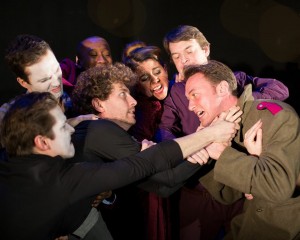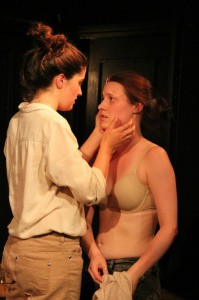There seems to be no limit to the Faction’s creative ambition and this third and final instalment in their latest Rep season is arguably their most ambitious work to date.
Not content with another straightforward adaption, the company commissioned Gareth Jandrell’s Thebes for this production, a brand new piece which draws from not one, but several tragedies by Sophocles and Aeschylus, weaving together various pieces of speech and plot elements masterfully. Oedipus and Antigone meet Seven Against Thebes as Jandrell shifts the focus of the stories from the plights of individuals and their relationships with the gods to political unrest and tyranny.
Despite this marked alteration, the inhabitants of Thebes remain physically central to Jandrell’s drama, and director Rachel Valentine Smith uses this to her full advantage, taking the Faction’s traditionally excellent ensemble work to an inventive new height. All twelve of the cast remain on stage throughout the piece, periodically forming a sinisterly “hoodied” Chorus which rolls and punches its way through the action, delivering not only simultaneous speech but assortments of animal sounds, yelps and yowls as it moves, sometimes in the company’s trademark stylised slow motion, sometimes as a mass of entwined bodies. To quote the text itself, this Chorus is a ‘malleable entity’ forming ‘the set’, ‘the people’, ‘the sound’, and the device does not fail.
As ever, there are some inspiring performances. Kate Sawyer is completely credible as Jocasta, the queen Oedipus marries whilst oblivious to the fact she is his mother. Lachlan McCall’s Oedipus is similarly convincing as he discovers the horrific truth about himself and gouges his own eyes out, although he possibly lacks some of the gravitas and stature necessary for such a weighty role. Cary Crankson delivers another effortlessly smooth performance as the increasingly power-hungry Creon, brother-in-law of Oedipus, and Derval Mellett’s Antigone seethes with determined passion.
Whilst this is undeniably a memorable, bold and powerful piece of theatre, one cannot help but feel that whilst it is one of the Faction’s most ambitious productions it is also one of its most inaccessible, relying heavily on the audience having a good deal of prior knowledge of its subject matter in order to glean full appreciation and understanding. The lack of scenery and props, which usually works beautifully for the Faction, unfortunately makes a hard-going piece even harder going. Whilst it is fantastic to be presented with the full text in the programme, those of us unfortunately less familiar with the works of ancient Greek tragedians would have appreciated a brief synopsis of events, too.





